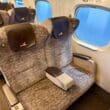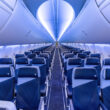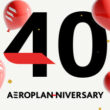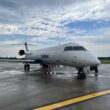Earlier today, United Airlines filed its perimeter exemption slot request for Washington’s Reagan National Airport (DCA). The Chicago based carrier, which operates a large hub at nearby Dulles International Airport (IAD) and fought against slot expansion, has requested an additional DCA-SFO frequency from the Department of Transportation (DOT).

If granted, the carrier would operate twice daily between San Francisco International Airport (SFO) and DCA, the closer in and more preferred to the D.C. area airports. As a backup, or secondary priority, United has requested a slot pair to operate service between DCA and Los Angeles International Airport (LAX).
Regardless of which route is selected (if either of them are), United is planning to operate Boeing 737-8 MAX Aircraft on the route. I had the opportunity to fly on United’s MAX 8 in First Class a couple years ago and enjoyed the flight.

With this filing we now know where all of the eligible airlines plan to fly should they be granted slot pairs. The DOT noted that they are only planning to assign one slot pair per airline of the five that are available, meaning that someone will be on the outside looking in.
Who Has Requested Perimeter Exemption Slots
Eight airlines have made requests for the five available slot pairs available at DCA. Three will be left out in the cold. Alaska, American, Delta, Frontier, JetBlue, Southwest, and Spirit have announced their intent along with United.
- Alaska has requested an exemption to fly between DCA and San Diego (SAN). San Diego is the largest market without direct service to Reagan National airport.
- American partnered with the City of San Antonio in its bid to connect Washington D.C. with the nation’s 7th largest city.
- Delta wants to connect its Seattle (SEA) hub to DCA. The route is already operated by Alaska Airlines but Delta is touting its international connections, especially to Asia, to make its case.
- Frontier has requested a slot pair to operate Between DCA and Jan Juan, Puerto Rico (SJU). This would compete with JetBlue who is already in the market though they, along with Spirit, weren’t listed as approved airlines.
- JetBlue is looking to add a second daily flight between DCA and San Juan, Puerto Rico (SJU) as they bolster their presence in the Puerto Rican market. While not in the press release, JetBlue did include DCA-LAX as a backup in their filing with the intention of offering Mint service on the route.
- Southwest is looking to roll a double with its bid to fly between DCA and Las Vegas, a route already operated by American Airlines. Southwest sweetened the deal by adding a one stop, no change of plane flight to Sacramento as part of the request.
- Spirit wants to connect DCA with San José Mineta International Airport (SJC). This request is somewhat cloudy as it’s unclear whether they are even eligible. Even if they are, Spirit is classified as a limited incumbent, along with Alaska, and only one exemption is available.

Who’s In, Who’s Out
Looking over all of the options presented for the five new slot pairs, American and Alaska feel like shoe-ins. American’s proposed service connects a major Texas military city with Washington’s closer-in airport and has the backing of Senator Ted Cruz, who helped pass the bill. Alaska is proposing a link between the nation’s capital and San Diego, the largest market without service to DCA. I feel extremely confident that these two routes will be added. Frontier and Spirit’s bids are the only ones that can beat out Alaska and nobody really seems certain if they’re even eligible.

Delta and Southwest are both looking for slots to operate routes that are already served by other carriers. While this would be good for competition, it doesn’t open up any new routes outside of the perimeter at DCA. Delta is looking to add a flight to Seattle (competing with Alaska’s service) and Southwest is looking to add a flight to Las Vegas (competing with American).
United and JetBlue are both asking for an additional frequency on a route that they already serve. JetBlue’s service to San Juan currently has no competition while United competes with American between DCA and San Francisco. Both of them have requested DCA-LAX as a backup.
One of them will be left out in the cold along with Spirit and Frontier. My best guess is that JetBlue gets its second choice of DCA-LAX, increasing competition on the route with United left on the sidelines. I’d feel more confident in making an assessment if either had requested DCA-LAX as its first choice.
Summary
Today is the final day for airlines to apply for one of the five available perimeter exemption slot pairs at DCA and we now know where all eligible airlines (and maybe one ineligible airline) plan on flying. United has submitted its application for Perimeter Exemption Slots at DCA. Now, we just have to wait and see who gets selected. The deadline for stakeholder comments is July 17th so we should know who gets slots soon.







Alaska isn’t a limited incumbent – it has a codeshare with American and DOT has always excluded these carriers from new limited incumbent slots for the past 25 years. Frontier and Spirit raise this in their applications. So that means it is Frontier and Spirit if anyone that is competing for limited incumbent slots. Alaska is part of the legacy carrier group of non-limited incumbents.
While I don’t disagree that there are flaws in how the airlines have been bucketed, the fact of the matter is the regulation states that Alaska is not only a limited incumbent but, the only limited incumbent eligible for a slot pair. I think Spirit and Frontier have legitimate gripes, and your point about the codeshares putting AS into non-limited incumbent territory is valid. The FAA and DOT have painted themselves into a corner here and it’ll be interesting to see how it all shakes out.
If the scenario plays out the way you described, I think Alaska, American, Delta, and Southwest would be granted non-limited incumbent slots and Spirit would get the nod over SJU, though I don’t feel confident in that prediction. Plus, I don’t think the FAA and DOT will reverse course without a legal challenge.